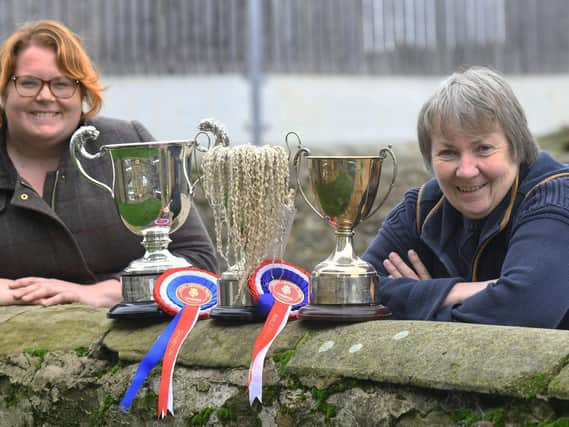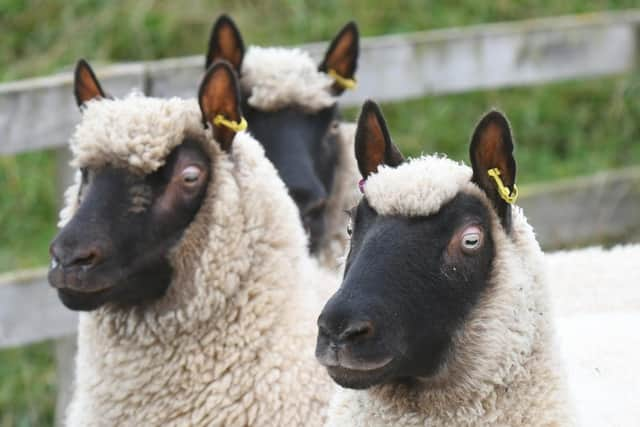Richmond farmer joins a new collective to promote native breed meat and fleeces from her award winning Clun Forest sheep


Anna, who has just moved with her parents Richard and Julie to Home Farm, near Catterick, is also part of a fledgling new group aimed at promoting native breed meat and fleeces, the Food + Fleece: British Native Producers Collective.
This year has seen Anna increase her ewe numbers to 110 with a mix of pedigree Cluns, Clun Mules and Texel X Clun Mules and has plans to grow the flock over the coming years to between 200-300 ewes.
Advertisement
Hide AdAdvertisement
Hide AdTaking it to a commercial operation was all born from showing the breed and that only came about when mum Julie found dealing with the family’s herd of native Dales ponies a challenge.


“We moved north from Lincolnshire 13 years ago,” Julie said.
“We breed Dales ponies and North Yorkshire along with Teesdale is where they are most commonly found and we wanted to move up here.”
The family ran Pennell’s Nurseries, in Lincolnshire, and the plan was for Richard, a seventh generation nurseryman, to retire with the couple’s sons taking over – something Julie said hasn’t quite happened yet.
Advertisement
Hide AdAdvertisement
Hide AdSo along with their 28 ponies they made the move north to Todd Fall Farm, near Darlington.
But a spell of ill-health meant Julie struggled to handle the ponies and she decided to get some sheep which she would find easier to deal with.
Anna said they started half a dozen Lincoln Longwool ewes and a ram, and three Wensleydale ewes.’
“I was just back from university and was really not interested in them,” she said
Advertisement
Hide AdAdvertisement
Hide Ad“I was happy with our Dales Ponies. Showing and breeding was our thing and in the last three years we have been top breeder at the Horse of the Year Show. We now have 26 Dales Ponies, 12 of which are mares and we breed a foal from each mare on alternate years.”
Having started to show the sheep as well as the horses Anna said there was a point where she decided it was time for a more professional approach in line with the way they showed the ponies.
“We had showed the Dales to a really high level, including being reserve champion at the Great Yorkshire Show, and we got to the point with the sheep where we seemed to be just muddling along.
“I enjoy showing and that’s when I said that if we were doing this we were going to do it properly.”
Advertisement
Hide AdAdvertisement
Hide AdTwo years ago, Anna won the pedigree down breed interbreed championship at Harrogate with a Clun Forest ewe and was reserve champion of the whole show. She also had Wensleydale male champion and reserve breed champion. The Clun Forest win was to be the catalyst for the move to the 145 acre Home Farm, at Brough Park.
“I’ve been secretary of the Wensleydale Sheep Society for four years. It was while showing them at the Royal Norfolk Show in 2017 that I started talking with a friend who had Cluns. I fancied a Down breed and that’s when I purchased the two gimmer lambs from Derek Knowles in St Albans.
“One went on to win at the Great Yorkshire then a week later went one better to take the Supreme Championship at the Royal Welsh Show.”
Buoyed by the success, Anna and Julie began realising the true potential of the breed that was once very popular among the livestock markets up and down England.
Advertisement
Hide AdAdvertisement
Hide Ad“They are such good mothers. They lamb easily, milk easily and their lambs grow on very well. We are now heading towards a commercial flock, which is why we are changing farms,” Anna explained.
“The Clun Mule was a very popular breeding sheep in the 1960s and 70s before the North of England Mule. The Bluefaced Leicester is put to the Clun to create the Clun Mule. They just fell out of fashion, around the show pens there is always some old boy who will come across and say he remembers them and the days when they were everywhere.”
Anna said it would take a bit of time to build the flock up to where they want to be.
“This is a big step up. Of our 110 ewes there are 35 pure Cluns with the rest, either Clun Mule and Clun having gone to the Texel. We are at the start of our commercial sheep farming journey. We know the Clun Mule is more prolific, mostly giving two lambs, whereas the Clun Texel will give us nearer one and a half. We want to see how they all perform.”
Advertisement
Hide AdAdvertisement
Hide AdAnna said the plan is to lamb inside from mid-January through February.
“If the majority of our lambs are away by around the Great Yorkshire we can benefit from the better prices of early season lamb.”
Anna has recently been instrumental in setting up the Food + Fleece: British Native Producers Collective, brainchild of Rachel Willan in Cumbria.
“There is such a disconnect,” Anna said. “People want to buy meat locally from a farm, but don’t know how, so we’ve created this website and social media presence that offers a directory of farmers who are producing meat from British native breeds of sheep, cattle, pigs, goats and poultry.
Advertisement
Hide AdAdvertisement
Hide Ad“Everyone involved signs up to our ethos of high welfare, happy animals. It’s also about fleeces too. There is now a fantastic demand from spinners and weavers for Wensleydale and other longwool breeds and people want to know where they can buy. We started out with six of us and in just one week we went to over 30 producers.”
The Pennells’ farming operation will focus on native breeds with a mix of the Dales Pony stud, Cluns and Wensleydale sheep, along with a handful of Lincoln Longwool and Black Wensleydales along with native breed poultry.
Anna said they also have plans for some native pigs in their woodland, a farm shop and creative workshop.
“Everything is about native breeds,” she said.
Support The Yorkshire Post and become a subscriber today. Your subscription will help us to continue to bring quality news to the people of Yorkshire. In return, you'll see fewer ads on site, get free access to our app and receive exclusive members-only offers. Click here to subscribe.
Link to use: https://www.yorkshirepost.co.uk/subscriptions
Comment Guidelines
National World encourages reader discussion on our stories. User feedback, insights and back-and-forth exchanges add a rich layer of context to reporting. Please review our Community Guidelines before commenting.